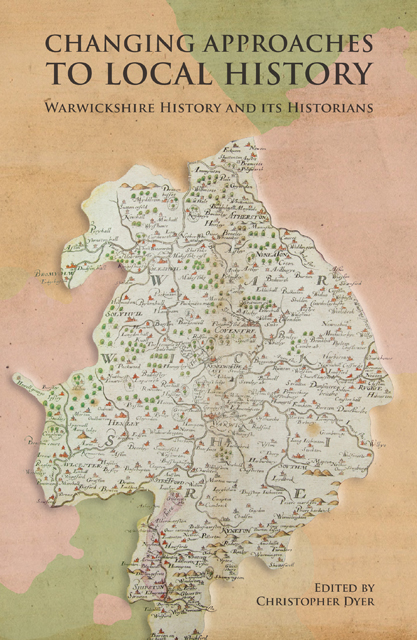Book contents
- Frontmatter
- Contents
- List of Illustrations
- Notes on Contributors
- Foreword
- Acknowledgements
- List of Abbreviations
- Introduction
- 1 The Dugdale Society: Its First Hundred Years
- 2 The Beginnings of Coventry
- 3 Was Commerce in Late Medieval Coventry Restricted by Regulation?
- 4 Studying Late Medieval Small Towns in Warwickshire 1920–2020
- 5 Rural Warwickshire in the Middle Ages: Society and Landscape
- 6 Religion, Rebellion and Red Jackets: Changing Approaches to Society and Politics in Sixteenth-century Warwickshire
- 7 Social Networks, Intellectual Affinities and Communal Harmony in Post-Reformation Warwickshire
- 8 Discovering Warwickshire’s Vernacular Architecture
- 9 Local History and the English Civil War: A View from Warwickshire
- 10 Writing Histories of the Landed Elite in Georgian Warwickshire
- 11 The Victoria County History in Warwickshire
- 12 Writing Women into the Political History of Warwickshire
- 13 Shakespeare and the Warwickshire Landscape in the Age of the Tourist
- Conclusion
- Index
6 - Religion, Rebellion and Red Jackets: Changing Approaches to Society and Politics in Sixteenth-century Warwickshire
Published online by Cambridge University Press: 17 December 2022
- Frontmatter
- Contents
- List of Illustrations
- Notes on Contributors
- Foreword
- Acknowledgements
- List of Abbreviations
- Introduction
- 1 The Dugdale Society: Its First Hundred Years
- 2 The Beginnings of Coventry
- 3 Was Commerce in Late Medieval Coventry Restricted by Regulation?
- 4 Studying Late Medieval Small Towns in Warwickshire 1920–2020
- 5 Rural Warwickshire in the Middle Ages: Society and Landscape
- 6 Religion, Rebellion and Red Jackets: Changing Approaches to Society and Politics in Sixteenth-century Warwickshire
- 7 Social Networks, Intellectual Affinities and Communal Harmony in Post-Reformation Warwickshire
- 8 Discovering Warwickshire’s Vernacular Architecture
- 9 Local History and the English Civil War: A View from Warwickshire
- 10 Writing Histories of the Landed Elite in Georgian Warwickshire
- 11 The Victoria County History in Warwickshire
- 12 Writing Women into the Political History of Warwickshire
- 13 Shakespeare and the Warwickshire Landscape in the Age of the Tourist
- Conclusion
- Index
Summary
This chapter considers a collection of State Papers known as SP12/61. The calendar entry for this manuscript tells us that SP12/61 is a ‘volume relating to the Musters and military force of the county of Warwick’ in 1569, the year of the rebellion in the north of England led by the earls of Northumberland and Westmorland. Rather than offering a survey of how interpretations of Warwickshire in the sixteenth century have changed over time, this chapter investigates changes in the approaches, methods and preoccupations of the historians of the county by considering how this one source reflects those changes.
Although unified by their collective description as documents connected to the musters, SP12/61 contains a variety of different types of document bound together in one book, the majority of which are copies of the originals. It is an anomaly of its kind in the manuscripts that we have for 1569, which suggests that it performed a specific function. Given the predominance of documents relating to the hundred of Kineton, SP12/61 may well have been a lieutenancy book used by Sir Thomas Lucy (d. 1600), muster commissioner for the hundred and deputy lieutenant to the lord lieutenant, Ambrose Dudley, earl of Warwick (d. 1590). It augments recent research on the lord lieutenancies, giving us a detailed account of how one county prepared for conflict well before the threat from the Spanish in the 1580s. It includes two muster lists with names, one partial and one complete, as well as copies of correspondence between the Privy Council, the Warwickshire magistrates and the Dudley earls of Warwick and Leicester, including that dealing with the rejection of the first muster certificate that led to a political crisis in the county. The first muster list spans the first twelve folios and is a partial list that dates from April 1569. It gives numbers of available men in each parish, as well as names of the gentry in the hundreds of Knightlow, Barlichway and Kineton (those hundreds approximately in the east, west and south of the county), but does not include any information for the northern hundred of Hemlingford. It is followed by a complete muster book which forms the heart of the manuscript, covering nearly forty folios with the names of those men fit for the militia, with their parish of residence and weapon specialism.
- Type
- Chapter
- Information
- Publisher: Boydell & BrewerPrint publication year: 2022



